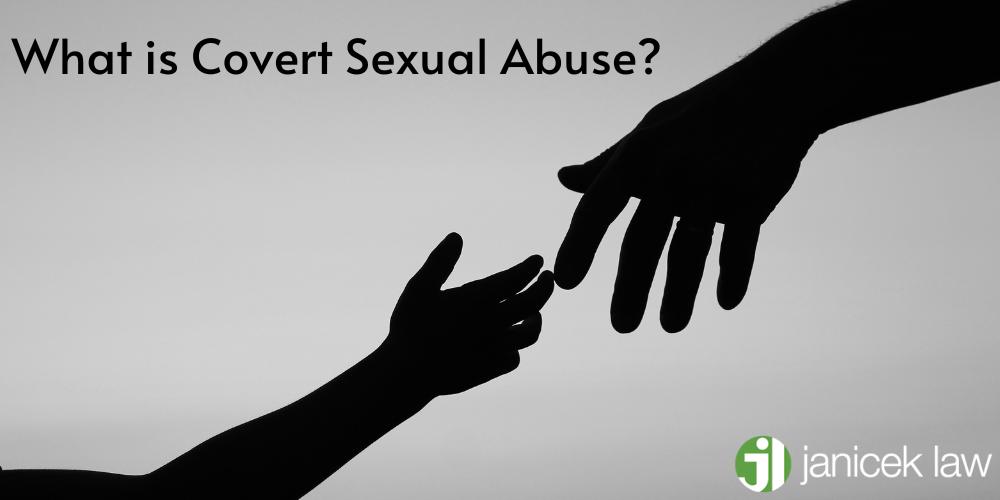Sexual abuse that doesn’t involve actual sexual contact, but rather involves lots of emotional abuse and manipulation, is called covert incest or covert sexual abuse. Experts do not know how common emotional incest or covert sexual abuse is because it’s not widely understood or talked about. What they do know is that covert sexual abuse between adults and children is an incredibly traumatic experience that can lead to lifelong mental health problems and relationship problems. Below, the legal team at Janicek Law breaks down the complexities of covert sexual abuse and discusses whether or not you can take legal action.
If you have suffered physically, emotionally, or financially due to sexual abuse, you may have grounds to take legal action in the state of Texas. Call San Antonio sexual abuse lawyers at 210-266-4949 to schedule a free consultation today.
What is Covert Sexual Abuse?
Covert sexual abuse – also known as covert incest or emotional incest – is emotional or sexual abuse that’s not openly displayed. In other words, covert sexual abuse does not involve actual sexual contact. Instead, it can include emotional manipulation, unwanted sexual comments or conversations, early exposure to pornography or other sexual content, and body shaming.
Covert sexual abuse usually involves a child. The other party involved can be a parent, a doctor, a teacher, a clergy member, a Boy Scouts leader, or anyone in some position of power over the child. Over the last couple decades, covert sexual abuse and grooming has become a very common occurrence online, between children and adult strangers.
Most commonly, though, covert sexual abuse occurs within a parent-child relationship. The term that better describes this dynamic is covert incest or emotional abuse, because in many cases, the parent does not engage in any sexual contact with the child. Instead, the parent seeks the same level of emotional intimacy from their child that they would normally receive from a romantic partner. There are very few healthy boundaries between the parent and child, which blurs the line of normal familial roles.
Enmeshment and Parentification
Covert incest between parent and child is very similar to the concepts of enmeshment and parentification.
Enmeshment refers to a severe lack of appropriate boundaries among family members, which results in malfunctioning family dynamics. This means that everyone is confused about what their specific roles and expectations are within the family dynamic. The child may feel more like a parental figure or a surrogate spouse than an actual child. The parent may feel like nothing more than a partner or a spouse or even a best friend – and not a parent.
Meanwhile parentification occurs when a child has to take on the role of a parent in some way. Parentification can mean actually raising fellow siblings due to absent parents, or it can mean taking on the emotional burden of family members, much like an actual parent would do. Emotional parentification is most similar to emotional incest.
Covert vs. Overt Sexual Abuse
Overt sexual abuse is sexual abuse that is openly displayed. Many cases of sexual violence also involve some level of emotional manipulation, but the main element is actual physical contact in a sexual manner.
Overt sexual trauma can be:
- Rape, which is unwanted penetration of the mouth, anus, or vagina with any body part or object.
- Molestation, groping, and/or fondling.
- Stealthing, which is when a sexual partner removes their condom during intercourse without the victim’s consent.
- Engaging in any kind of sexual activity while the victim is under the influence of drugs or alcohol.
- Overt incest, which is sexual activity that occurs between family members.
- Forcing someone to perform sexual acts upon the perpetrator.
- Taking, distributing, or showing sexually explicit content without the victim’s consent.
Unlike physical incest, emotional incest only involves the emotional side of a normal romantic relationship. Except this emotional intimacy doesn’t exist between romantic partners, it exists between a parent and a child.
Finally, emotional incest differs from overt sexual abuse because in most cases, there is no physical, sexual contact involved.
Examples of Covert Sexual Abuse
Common examples of covert sexual abuse can include:
- Adults having sexual conversations with teens or children, whether that be asking them about their sexual/romantic life or providing too many details about their own sex life.
- Adults confiding in children about their emotions or traumatic experiences, which puts the child in the role of a therapist, a close friend, or a romantic partner.
- Parents insisting on bathing, wiping, or changing their child even though the child is at an age where they can do these things by themselves.
- A parent ranting and confiding in their child about their marital problems, sex life, money problems, or work problems.
- A parent who frequently tells their child something along the lines of: “You’re my whole world and my other half. All I need is you, I don’t need anyone else.”
- Parents who openly bash each other in front of their children, and try to get the child to be “on their side.”
- Parents who give romantic or emotional gifts to their children, such as romantic cards with love notes or other objects with lots of emotional value.
- A parent who does everything with their child, making them feel like they cannot have a life without their parent for fear of “abandoning” them or hurting their feelings.
- A parent who frequently crawls into bed with their child to hold them, cry to them, and/or confide in them like they would to a romantic partner.
- Parents who frequently comment on their child’s appearance in a sexual way, or parents who make frequent comments along the lines of: “Look how beautiful and curvy you are! Men are going to be all over you one day.”
Emotional incest is rarely a one time occurrence. It usually continues throughout the entirety of a victim’s childhood, and sometimes even into early adulthood, depending on when the child finds the strength to set firm boundaries.
Recognizing and Diagnosing Emotional Incest Syndrome
Emotional incest is incredibly complex and difficult to recognize. Emotional incest syndrome is not an official diagnosis within the DSM-5, rather, it is more of a phenomenon coined by psychologist Kenneth Adams in the 1980s.
Mental health experts have since created a scale, called the Childhood Emotional Incest Scale (CEIS), to help victims determine whether they have endured this traumatic experience. According to this scale, the main elements of emotional incest syndrome include a surrogate spouse and an unsatisfactory childhood. This means that parents rely on the child for emotional and/or romantic support which causes the child to miss out on forming important, appropriate relationships with people their own age.
The scale includes the following statements to describe the “surrogate spouse” element:
- In times of crisis or trouble, the child had to act more mature than the parent(s).
- The child frequently had to give advice and support to the parent when they’re having romantic relationship problems.
- During arguments between parents, the child felt like they had to take a side and support one of the parents over the other.
- During arguments between parents, the child felt like they had to help them resolve the argument.
- After an argument between parents, one or both parents turned to the child for emotional support, comfort, and reassurance.
- Parent(s) frequently unloaded their emotional burdens and troubles onto the child.
The scale includes the following statements to describe the “unsatisfactory childhood” element:
- In order to maintain harmony and peace within the household, the child had to take on an emotional role or parental responsibilities which were not appropriate for their age.
- The child felt like they could not fully enjoy their childhood given the emotional stress they endured and the adult responsibilities they had to take on.
- The parent’s emotional needs superseded the emotional needs of the child.
- The child frequently felt jealous of their friend’s relationships with their parents.
- It was necessary for the child to “grow up” and mature at a very young age in order to be the best support system for their parents.
- The child frequently had to manage household or parental tasks.
Victims of emotional incest are supposed to rank each statement with a number between 1 (never) and 5 (always).
Why Does Emotional Incest Happen?
Emotionally incestuous relationships can happen for a variety of reasons, but it’s usually rooted in the parent’s unresolved emotional or psychological issues. Factors that may drive parents to engage in covert incest include:
- A family history of covert incest – the parent is merely modeling the same relationship they had with their parent.
- Separation or divorce from their partner.
- Infidelity within the marriage and/or other unresolved marital problems.
- Lack of emotional intimacy within a marriage.
- Grief and loss from the death of a partner/spouse.
- Drug or alcohol addiction.
- Domestic violence.
- Fear of abandonment and/or attachment trauma.
- Personality disorders.
- A history of mental illness or trauma.

Why is Covert Sexual Abuse So Complicated?
Covert sexual abuse is very complicated because the victim may not have been physically sexually violated, but they still feel like they were. In other words, they often feel violated on an emotional level, like they were in a romantic relationship with their parent (or other adult) at an age where it was clearly inappropriate.
They may exhibit the same symptoms of trauma that overt sexual abuse victims experience, without understanding why.
“Nothing really happened, so why do I still have panic attacks, flashbacks, and nightmares?”
This often leads victims down a road of downplaying their own experiences and feelings. This issue is compounded by the fact that covert incest is not well understood or discussed within society. It’s closely related to many other issues and concepts, such as sexual grooming, enmeshment, and parentification. The victim may not realize what has happened to them until well into adulthood when they finally see a therapist, feel validated, and accept the reality of what happened during their childhood.
Covert incest is also very complicated when it’s actually happening. The child often has incredibly conflicting and confusing feelings when their parent relies on them for emotional support. They may feel privileged at first that an adult could trust someone of their age to keep their dark secrets and involve them in adult conversation. But this feeling of privilege also exists with resentment and anger towards the parent for not allowing them to be a child during their childhood years.
Additionally, control is often a very common theme among children experiencing emotional incest. The parent may want to control the child’s thoughts and feelings about their other parent, the child’s thoughts and feelings about them, who the child is allowed to see and talk to, what other activities the child engages in, what the child likes, and who the child is. This level of abusive control drastically affects the child’s emotional, sexual, and relational development as they reach adulthood.
Long-Term Effects of Emotional Incest
Those who have experienced emotional incest will often exhibit a wide range of mental health issues. How emotional incest affects the victim will depend on their specific situation. But most commonly, victims exhibit symptoms of PTSD, similarly to overt sexual abuse victims.
Other long-term effects include:
- Low self-esteem
- Self-harm and suicidal tendencies
- Addictions and compulsive behaviors such as sex addiction, food addiction, drug addiction, alcoholism, etc.
- Eating disorders
- Anxiety and depression
- Relationship problems involving abuse and/or lack of intimacy
- Difficulty setting boundaries in other adult relationships, such as friendships, professional relationships, and romantic relationships
- Difficulty setting boundaries with parent(s) even during adulthood
- General dissatisfaction with life
- Difficulty creating their own identity outside of their relationship with their parents
- Difficulty regulating and managing emotions
- An inability to recognize and meet their own needs as an adult
- Attachment trauma
- A general sense of loneliness and isolation
- Unhealthy perfectionism
- Intense feelings of guilt and shame if and when they set boundaries with parent(s)
Healing From Emotional Incest
Covert incest is often a long-term traumatic experience that can take years of therapy and appropriate psychiatric medications to heal from. If you have experienced emotional incest, you must see a trauma therapist to help you during the healing process. Most trauma therapists will recommend the following treatments for victims of emotional incest:
- Set Healthy Boundaries: Victims must learn to set healthy boundaries in all of their relationships, but especially in parent-child relationships. If the parents refuse to accept the boundaries, the next step is often going no-contact. Setting boundaries is a major challenge for victims because many of them don’t know what healthy boundaries look like. A therapist can help you navigate this uncertainty so that you may have healthy adult relationships moving forward.
- Inner Child Healing: Victims of emotional incest did not get a chance to be and feel like a child during their childhood years. So inner child healing often involves imagining you’re sitting next to the child version of you, and offering them the compassion, love, and understanding they never received from their parents.
- Seek Support from close friends, siblings, or a support group. Recovering from both covert and physical incest is incredibly hard work. You need people to support you, listen to you, understand you, and encourage you during the healing process.
- Journaling: Writing letters to your younger self and just jotting down your thoughts and feelings on a regular basis can be incredible healing tools during this confusing time.
Can You Sue for Sexual Abuse?
Yes, you can file a civil lawsuit for any form of sexual violence, especially if you have suffered severe emotional distress and financial loss due to the abuse. Civil sexual abuse cases can be incredibly complex and difficult to prove which is why it’s so important to hire a San Antonio sexual abuse lawyer at Janicek Law. Our compassionate legal team will listen to your story, help you determine if legal action is the best solution, and fight for your legal rights.
Sexual Abuse Damages
San Antonio sexual abuse lawyers at Janicek Law can help victims recover financial compensation for the following types of damages:
- Past and future medical expenses relating to psychiatric medications, psych ward hospitalizations, and stress-related physical ailments
- Lost wages of your sexual trauma has caused you to miss work
- Loss of earning capacity if your sexual trauma prevents you from accomplishing one or more of your job duties
- Emotional distress
- Mental health counseling expenses
- Loss of consortium if your sexual trauma prevents you from having a normal relationship with your spouse

Call San Antonio Sexual Abuse Lawyers at Janicek Law Today
If you have suffered physically, emotionally, and financially from any form of sexual abuse, you may have grounds to file a civil sexual abuse lawsuit. The legal team at Janicek Law has decades of combined experience in helping victims obtain fair compensation and justice for their suffering. We can help you do the same. Call 210-366-4949 to schedule a free consultation at our law firm today.

